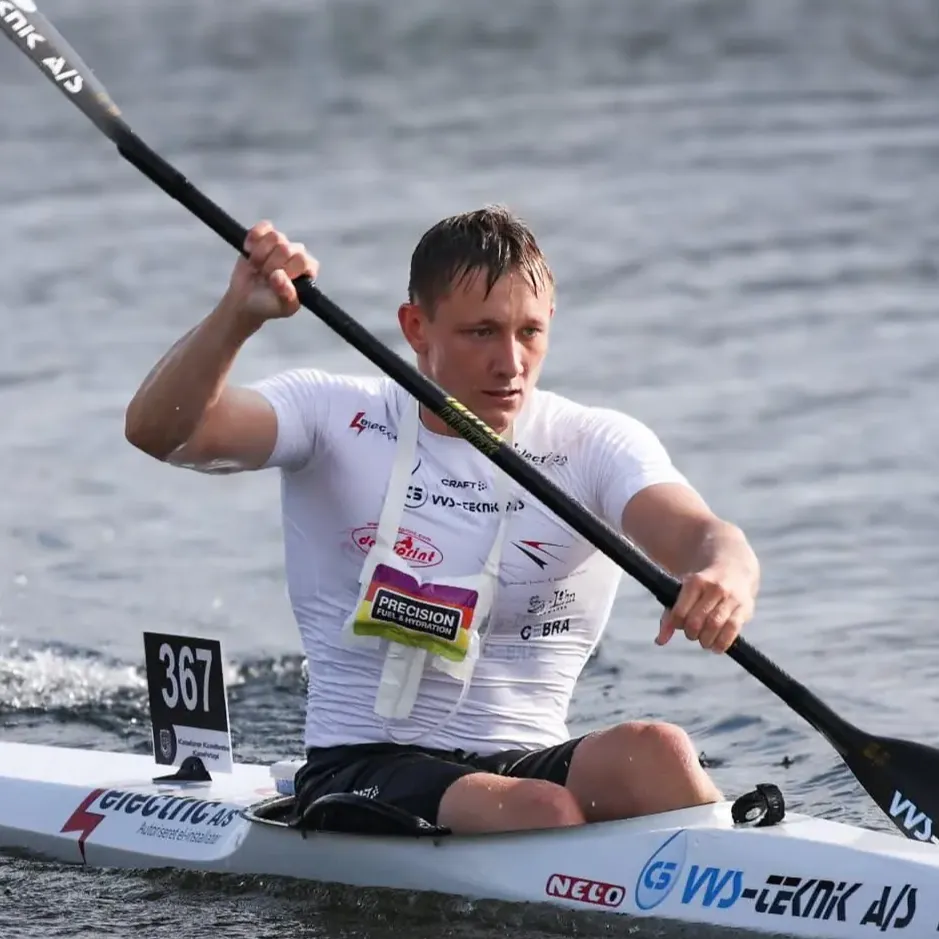
Philip Knudsen
ICF Canoe Marathon U23 World Championships
Philip's headline numbers
Philip's strategy
Fueling
Carbohydrate is the main fuel you burn when racing. Failing to fuel properly is a leading cause of underperformance in longer races.
After starting to work with the PF&H team earlier in 2025, Philip has been focusing on refining his carb intake before and during races. As is common in paddling events, the race had an afternoon start (4:15pm), so he followed the recommended guidelines for a later start time, by consuming two carb-rich meals (oatmeal and pasta for breakfast and lunch respectively), alongside high-carb snacks (banana and PF 60 Chew Bar) to boost his carb intake with minimal fat and fibre. Not only was he racing the U23 K1 event, but Philip also took part in the K2 event with World Champion Mads Pedersen. Back-to-back days of high-intensity racing meant that high-carb availability was essential both before and during the race for optimal performance and recovery. To meet these demands, he achieved his highest in-race carb intake to date, ~75g/h, a significant 29% jump from ~58g/h at the U23 European Champs just three months earlier. This progression is a result of Philip undergoing a period of gut training, whist also refining how he carries his fuel during races - he now carries a significant amount of PF Carb Only Drink Mix and PF Carb & Electrolyte Drink Mix in his drinks bads as this is the most efficient way for him to get carbs on board 'hands-free', without needing to stop to open wrappers!
Hydration
Taking on board an appropriate amount of fluid and sodium is essential to maintaining blood volume and supporting the cardiovascular effort needed to perform on race day.
Whilst the absolute amount of sodium and fluid consumed per hour is important, it’s critical to consider these in relation to each other. This is known as 'relative sodium concentration' and it’s expressed in milligrams per litre (mg/L). How much sodium you’re taking in per litre of fluid is more important than the absolute amount taken in per hour.
Hydrating and fueling is logistically tricky in marathon canoe racing, but Philip once again executed his fluid and sodium plan that met his individual needs to support his world-title winning performance. To do this, he used two homemade drink bags hanging around his neck; the first containing 750ml of PF Carb Only Drink Mix and PH 1000 (Tablets) and the second, picked up at the third portage (where he carries the boat between each lap on the water), containing 500ml of PF Carb & Electrolyte Drink Mix. These bags not only delivered all of his in-race carbohydrate, but also allowed him to maintain his fluid and electrolyte balance whilst working at an extremely high intensity for just under 2 hours.
Caffeine
Beyond the Three Levers of Performance (carb, sodium and fluid), caffeine is one of only a few substances that is proven to improve performance for most endurance athletes as it can help stave off mental and physical fatigue.
In terms of caffeine, Philip stuck with his successful strategy from the European Champs. He had one PF 30 Caffeine Gel within the final 20 minutes of the race to benefit from the stimulant’s ergogenic effects. He made a deliberate decision not to have a bigger dose as he was wary of the negative side effects and impact this could have on his sleep and, therefore, recovery ahead of racing again the next day.
How Philip hit his numbers
Here's everything that Philip ate and drank on the day...
Philip's weapons of choice
Final thoughts
Philip's full stats
Data Confidence?
There is good confidence in the accuracy of the data reported. An athlete feels that the numbers closely reflect what they consumed despite a couple of estimations which may carry some degree of error. The majority of what was consumed is recorded to a high level of specificity (most volumes are known through the use of bottles brands quantities flavours). The numbers are very plausible and align with previous data recordings (if an athlete has collected data previously).